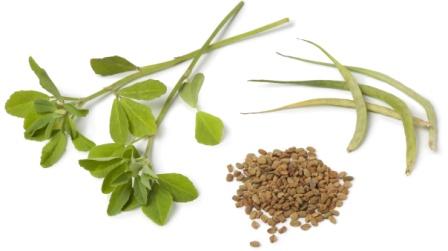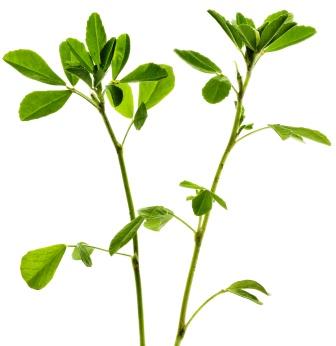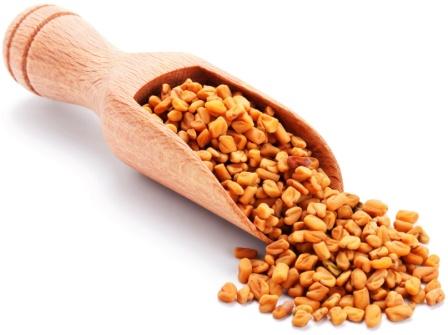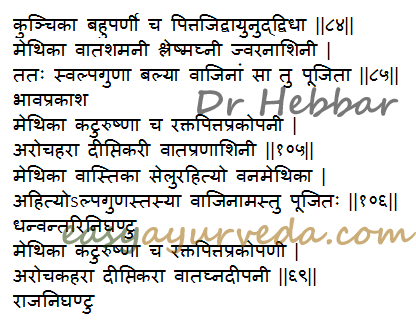Fenugreek (Methi) Uses, Dosage, Side Effects, Research
Fenugreek (Methi) seeds improve digestion, useful in anorexia and diabetes. Fenugreek leaves are used as vegetables across India.
Table of Contents
Benefits, Indications
It is used for the treatment of arthritis, asthma, bronchitis, digestive disturbances, male impotency, skin ailments, sore throat, acid reflux, hormonal disorders, type 2 diabetes etc.
This is used as a nutritive supplement especially in growing children and during pregnancy as well as lactating period. Its powder, medicated milk, sweet preparations etc are used for this purpose.
How to consume fenugreek for diabetes:
An amino acid found in fenugreek (4HO-Ile) is responsible for anti diabetic activity.
5 grams once or twice a day of seed or seed powder is useful in diabetes. Either the seeds can be chewed or swallowed or it can be made into paste with water, rolled into the form of tablets. The seeds can be soaked in water overnight for easy consumption.
Fenugreek for bloating, gastritis:
A teaspoon of fenugreek powder or seeds is added to a cup of fat-less buttermilk. If needed a pinch (very small amount that you can hold between thumb and index finger) of heeng (asa foetida) can be added to it. This is consumed at night, after food to relieve gastritis and bloating. Because of fenugreek’s laxative effect, this remedy is also useful to relieve constipation. The seeds can be soaked in water overnight for easy consumption.
Methika – fenugreek benefits as per Ayurveda:
Vatahara – useful in treating disorders of Vata Dosha imbalance such as neuralgia, paralysis, constipation, bloating, etc
Kaphahara – balances Kapha, useful in productive cough, asthma, bronchitis, chest congestion
May worsen Raktapitta –Bleeding disorders such as nasal bleeding, heavy periods, etc
Deepani – improves digestion strength
Improves breast milk secretion. Hence, its seed paste or powder – 5 – 10 grams, once or twice a day, is administered to the lactating mother.
Indicated in –
Abdominal colic pain
Aruchi – anorexia
Prameha – Urinary tract disorders, type 2 diabetes mellitus
It reduces cholesterol and useful for obesity
Home remedies
Few of the important home remedies as described by Dr MS Krishnamurthy MD (Ayu), PhD
Cholesterol
1. Fenugreek remedy for cholesterol:
10 gram fine powder of fenugreek is administered along with warm water (or buttermilk), daily.
5 grams 2 times a day can also be administered.
This reduces cholesterol significantly.
20-30 days’ administration determines the benefit.

Diabetes
2. Fenugreek – turmeric remedy for diabetes (Type 2 DM):
Equal quantities of fenugreek and turmeric are taken and fine powder is made. This is administered in the dose of 5 grams daily along with water, preferably in an empty stomach. This is effective in the treatment of Type 2 Diabetes mellitus.
Gastritis
3. Fenugreek fine paste in hyperacidity, gastritis:
3-5 grams of seeds are soaked in water overnight. Next day morning this is macerated well and fine paste is made.
As it contains mucilage, it helps in soothing the gastrointestinal inflammation by coating the lining of the stomach and intestine; After maceration it is consumed as it is. Or, half a cup of water can be added to it and can be consumed, 30 minutes before food.
It relieves the reflux esophagitis and gastritis.
Gut strengthening
4. Herbal tea of fenugreek in strengthening the gut:
Fenugreek seeds are fried a little and cooked well with milk (by adding little sugar, if necessary).This is taken as a substitute to tea or coffee.
This gives good strength to the intestines and improves the capacity of the digestion.
Lactating mothers
5. Medicated milk of fenugreek for lactating mothers:
5-8 grams of fenugreek seeds are soaked in water overnight. Next day this is cooked well with 200 ml of milk. If one likes, jaggery can be added. This helps to increase breast milk production and hence recommended to the lactating mothers.
Constipation
6. Fenugreek decoction (herbal tea) with ghee in constipation and hemorrhoids:
5-10 gram seeds are taken and cooked well with a cup of water and decoction is made. This is consumed while it is lukewarm along with half a spoon of ghee. This eases the bowel and hence relieves constipation as well as hemorrhoids.
Hair fall
7. Traditional oil of fenugreek for hair fall:
30-40 grams of fenugreek seeds are powdered well and taken in a wide mouthed steel vessel. To this 150 ml coconut or sesame oil is added and kept in sunshine for 6 days. Then it is filtered and stored.
Regular application of this oil (Adityapaka taila) acts as a good hair tonic.
Hair conditioner
8. Fenugreek paste as hair conditioner:
8-10 grams of fenugreek seeds are taken and soaked in water and kept overnight. This is made into fine paste and this is applied to the scalp as a hair mask. This is retained for 30-45 minutes and rinsed with water.
This acts as a natural conditioner for hair.
Click to consult Dr MS Krishnamurthy MD(Ayu), PhD
External application
Seed paste improves local blood circulation, relieves pain and inflammation in wounds, abscess, boils and swellings.
Warm methi powder when applied in the site of pain, inflammation, abscess reduce the symptoms.
The powder is applied to the skin as a cosmetic.
Application on the head prevents the hair falling and promotes hair growth.
In leucorrhoea, pessaries made up of Methika are used in Vagina and uterus.
The leaves are used both internally and externally for their cooling properties.
Sprouted seeds made into a paste can be applied alone or with aloe gel on the scalp, to promote hair growth and to remove dandruff.
Fine powder of Methi seeds mixed with honey-bee wax relieves chest pain if applied locally.
An infusion of the leaves is used as a gargle for recurrent mouth ulcers. A gargle made from the seeds of Methika is best for an ordinary sore throat.
Use in other systems of medicine
Unani:
Seeds and leaves of Methika are used. It is helpful over Ascites, old cough, and in disorders of liver and spleen. The use of its leaves internally as well as externally is helpful over swelling and burning sensation. It stops the falling of hair.
It was used by the Egyptians to make yellow dye, plasters etc. Seed paste was used to treat fever, diabetes and stomach complaints. Traditional Chinese herbalists used it for kidney problems and conditions affecting the male reproductive tract.
Side effects
Fenugreek side effects:
It is avoided when the person is having bleeding disorders such as nasal bleeding.
It is safe to take in a lactating mother and for children.
Some experts opine that fenugreek is not safe during pregnancy. But it is found to be used in small quantities even during pregnancy.
It is best to avoid diarrhea as it is a mild laxative
Interaction with medicines, supplements
Can this be used while taking Homeopathic medicine?
Yes. This product does not react with homeopathic medicine.
Can this medicine be continued while taking supplements like multivitamin tablets, Omega 3 fatty acids etc?
Yes. Generally, this product goes well with most dietary supplements. However, if you are taking more than one product per day, please consult your doctor for an opinion.
With western
medicines
Seek your
doctor’s advice if you are taking this product along with other western
(allopathic / modern) medicines. Some Ayurvedic herbs can interact with modern
medicine.
If both Ayurvedic and allopathic medicines are advised together, then it is
best to take Allopathic medicine first, wait for 30 minutes and then take the
Ayurvedic medicine.

Properties, part used, dose
Fenugreek – Methi medicinal properties:
Guna (qualities) – Laghu – light to digest, Snigdha – unctuous, oily
Rasa (taste) – Katu – Pungent, Tikta – Bitter
Vipaka- Katu – Undergoes pungent taste conversion after digestion
Veerya – Ushna – Hot potency
Effect on Tridosha – Balances Kapha and Vata Dosha.
Pharmacological action – Hypo – glycaemic, Insecticidal, Analgesic, Anti inflammatory
As per Bhojana Kutuhalam twelfth chapter, Methika is pungent in taste, hot in potency, vitiates rakta and pitta, It treats anorexia, appetizing in nature, stimulates digestive fire and alleviates vitiated vata dosha.
How to take fenugreek without aggravating Pitta Dosha?
Fenugreek can slightly increase Pitta Dosha. However, it is not as hot and spicy as other herbs such as chili, ginger, black pepper etc. Ghee can balance down Pitta.
A teaspoon of fenugreek can be mixed with a few drops of ghee, make a paste, take it with a cup of lukewarm water, at night, before food.
This can be continued for a month.

Part used- Seeds, whole plant
Fenugreek dose:
A general adult dose according to the Sharangadhara Samhita Madhyama Khanda, for swarasa is ½ pala or 2 tolas (24 gms) and for Kwatha is 2 pala or 8 tolas (96 ml) and that of choorna is 1 karsha or 1 tola (12 gms).
The accepted dose of the drug Methika according to the Ayurvedic Pharmacopoeia of India is as follows.
Choorna : – 3-6 grams
According to the Bhavaprakasha Nighantu Choorna mathra is 3-6 gms.
According to Nighantu Adarsha
Choorna – powder : – 6-12 grams
Swarasa – juice extract– 12 ml.
Methi Chutney
A chutney prepared with black pepper, mustard seeds, methi dana (fenugreek), cumin, ginger, salt and lemon is useful to relieve bloating and promotes digestion strength.
Some people also add cinnamon, ajwain, Pudina (mint leaves), coriander leaf and turmeric to it.
Chemical composition, nutritional content
Fenugreek chemical composition:
Steodidal saponins – diosgenin & gitoxigenin from seeds; Tigogenin, Trigonelloside, Yomogenin , Tetosides, Graceunin A,B,C H,I, J,K,L,M; trigofoenosides, oil, choline, trigonelline, yamogenin, gitogenin, diosgenin, tigogenin and neotigogens. etc.
vitamin C, niacin, potassium, lysine and L-tryptophan, steroidal saponins (diosgenin, yamogenin, tigogenin, and neotigogenin), iron, copper, manganese,magnesium , phosphorus etc
Nutritional content of fenugreek:
Seeds are rich in vitamins – thiamin, folic acid, riboflavin, niacin, B6, vitamins A, C and K.
It is also has copper, potassium, calcium, iron, selenium, zinc, manganese, and magnesium.

Sanskrit verse

Dalhana on Sushruta Sutrasthana 46
Ayurvedic medicines
Ayurvedic medicines with fenugreek as ingredient:
Mustharishtam – Uses, Dose, Ingredients And Side Effects Mustharishtam is a very effective Ayurvedic medicine. It is a liquid product. Bitter sweet in taste. Mustharishta is used to treat digestive complaints like diarrhea, indigestion, etc.
Dhanwanthararishtam – It is mainly used in Ayurvedic post natal care of the mother.
Limit Capsules – a proprietary Ayurvedic medicine, manufactured by Ayulabs Pvt Ltd, Rajkot, used in treatment of diabetes.
Liverson Tablets – a proprietary Ayurvedic medicine, manufactured by Ajmera Pharmaceuticals Pvt. Ltd. Indore. It is used in the treatment of hepatitis, jaundice etc.
Research
Blood glucose and lipid lowering effects:
Researchers conducted a clinical research study in the Infectious Diseases Research Center, Isfahan University of Medical Sciences, Isfahan, Iran. 24 type 2 diabetic patients were placed on 10 grams/day powdered fenugreek seeds mixed with yogurt or soaked in hot water for 8 weeks. Weight, FBS, HbA(1)C, total cholesterol, LDL, HDL and food record were measured before and after the study. 11 consumed fenugreek in hot water and 7 in yogurt The differences observed in food records, BMI and serum variables were analyzed using paired-t-test and t-student and P<or=0.05 was considered as significant.
The results of 18 patients were studied. Findings showed that FBS, TG and VLDL-C decreased significantly (25 %, 30 % and 30.6 % respectively) after taking fenugreek seed soaked in hot water whereas there were no significant changes in lab parameters in cases when consumed mixed with yogurt. BMI, Energy, Carbohydrate, Protein and fat intake remained unchanged during study. This study shows that fenugreek seeds can be used as an adjuvant in the control of type 2 diabetes mellitus in the form of soaked in hot water.
Botanical name- Trigonella foenum greacum Linn
Tries – Three
Gona – Angle, Little Angle
Foenum – Hay
Graecum – Large
Family- Fabaceae (Simbi kula / Aparajita upakula
Vernacular names
Names in different languages:
Hindi name – Methi
English name – Fenugreek
Kannada name – Menthya, Menthe
Telugu name – Mentulu (seed), Mentikura (plant), Menthikoora
Malayalam name – Ventiyam, Vendiyam, Uluva
Punjabi name- Metha, Shamli, Methi, Methini
Bengali name – Methis, Methi – shak, Methuka
Gujarati name – Methi, Methini, Bhaji
Marathi name – Methi
Oriya name – Methi
Tamil name – Venthaayam, Vendayam
Urdu name – Methi
Sanskrit synonyms
Methika, Methini, Methi, Vallari, Chandrika, Mantha, Mishrapushpa, Kairavi, Kunchika
bahuparni, Bahupatrika – numerous leaves and twigs
Peetha beeja – yellow seeds
Bahubeeja – numerous seeds
Gandhaphala – peculiar odor
Deepani, Bodhani, Ugra – improves taste, digestive
Methika – Which improves medha or intellect
It reduces fever Kunchika – Fruits are curved
Chandrika – Flowers are white or yellowish
Jatigandhaphala – Fruits are aromatic
Deepani – It stimulates appetite and digestion
Peetabeeja – Seeds are yellow coloured
– It is having compound leaves with more leaflets.
– having numerous seeds
– stimulates appetite and digestion
– Leaves resemble to those of Agastya – Sesbania grandiflora
– It is a slender herb
Synonyms as per morphology
Synonyms as per morphology:
According to leaf:
Bahupathrika, Bahuparni – These terms indicate the compound leaf with more leaflets.
Municchada – The compound leaf with its leaflets having similarity with Agasti leaf.
According to flower:
Mishrapushpa – flowers arranged in a bunch and they are beautiful.
According to seeds and fruits:
Bahubeeja – The fruit contains many seeds.
Gandhabeeja – Seeds possess distinct odor.
Gandhaphala – Fruits have an aroma.
Peethabeeja – Yellow colour seeds signifies the colour of Methika.
Kunchika – Morphological feature resembling the hilum
According to action:
Methika, Methi – Which improves ‘Medha’ or intellect.
Deepani – It increases the digestive power.
Bodhini – Bodha means Jnana. It improves the knowledge.
Jyothi – It improves the Pachakagni.
Sheethaveerya – Which is sheethaveerya.
Classification
Division : Spermatophyta
Sub Division : Angiosphermae
Class : Dicotyledonae
Sub Class : Polypetalae
Order : Rosales
Family : Leguminosae (Fabaceae)
Sub family : Papilionaceae
Genus : Trigonella
Species : foenum-graecum Linn.
Classical Categorization
Bhavaprakasha – Haritakyadi Varga. As per Bhavaprakasha, fenugreek is an ingredient of Chaturbeeja churna – a combination of Fenugreek, Garden cress, Kalonji and Bishops weed. The combination is very useful to relieve bloating, indigestion and abdominal pain. Read more about Chaturbeeja Churna
Dhanvantari Nighantu – Suvarnadi Varga
Raja Nighantu – Pippalyadi varga
Morphology
Annual herb
Compound leaves
Flowers – Axillary, sessile
Fruits – Pods
Dosage
Seed powder – 1 -3 gm
Sthanika karma (Action on different system)
External use – Paste has Anti inflammatory, Analgesic action. Hot paste is used to apply on abscesses to relieve edema and inflammation.
Nervous system – Indicated in neurological disorders. Strengthens the nervous system.
Digestive system – Carminative, digestant, Facilitate normal movement of doshas. Indicated in Colic pain, low digestive fire etc.
Circulatory System – Contraindicated in bleeding diseases. cause vitiation of rakta (blood) and pitta.
Reproductive system – Improve breast milk production. It can be given after delivery to increase breast milk production.
Satmikarana –Promote body strength. Indicated in body aches and pain due to general weakness.











36 comments
Dr Rajalakshmi Gopalan
Article on Methi is ectremely informative. I for one take about 2/3 gms. before breakfast. I feel very light and energetic.
AS
What books do you recommend for dravyaguna? Many writers write about action on dhatu is this something that is verified from texts or their own interpretation?
Dr Malini Bhat
Dravya guna book by Dr.JLN Shastry
Prachi
Hello….my dad is paralysed.right now he is taking statin/aspirin tablets to maintain cholesterol levels, so can we give methi seeds daily to him?
surenthar
Thanks sir
v.r.k.raman
v.r.k.raman
very useful article.
‘bloating and gastritis’ …..add a pinch of what? salt? also stated that it is
‘useful for constipation, as it is a mild laxative’. But,
in the ‘side effects’ section, ….’.to be avoided in constipation”
Pl. clarify
Dr J V Hebbar MD(Ayu)Author
Sorry that was dumb. 😛
Now corrected.
a pinch of heeng (asa foetida).
Side effects:
It is best to avoid during diarrhoea as it is a mild laxative.
jacubz
hello. when eat fenugreek bad smell comes. Is there way to reduce this?
Dr J V Hebbar MD(Ayu)Author
Hi, this is not of much use in the said condition.
sangeeta
thanks.so much information about fenugreek.
Tina
Dear Dr.
1-Taking 1 tsp of fenugreek seeds and boiling it .
Is this effective method to take? (2 times a day) . What will it help with?
is this becomes cooling tea for body still its hot in potency ?
2- is copper water is good to take or it has to balance with zinc
3- honey in hot chia is ok to take?
Dipti
With diabetes medicine I was taking g 3/4 time soak methi seed but result zero . My diabetes not coming down it’s 209/235
Usha Natarajan
Thanks Doctor for the useful articles. Some people are suggesting to take powder of fenugreek with ajwain and black jeera mixed. Is it helpful? Can we add cinamon also to it? Please clarify
Dhibjn
Can we take fenugreek if I have thyroid problem
Dganit Platt
Hello Dr.
Great artical. I am a vegan with IBS and a bit of low energy and foggy mind. I was recomended to take a teaspon of Methi a day so I thought to add it to breackfast with some gee. Is that ok? or will it be better at night with hing and a vegan buttermilk sub?
Dr J V Hebbar MD(Ayu)Author
Hi, you can take Methi either in the morning or at night, with ghee or water.
rosie
Hello Dr.
I like to drink metthi water ( SOAKED OVERNIGHT) in early morniing. Have to drink only menthi water? and can eat menthi seeds also. please reply. Thanks.
Dr J V Hebbar MD(Ayu)Author
Hi, you can drink the water and eat the soaked methi.
Dhanashri
I have Pitta Body Type and a pre-diabetic. I want to use Fenugreek (methi seeds). What is the best way I can consume it ? Thanks in advance.
Sharmistha Das
Dear doctor
Is there any benefit in presoaking lentils with fenugreek. Does it make it easier to digest.
Deepak
Hello Sir/Madam,
My left upper eyelid twitch or spasm from previous 5-6 month. It happens 3-4 time in a day. Some time lower eyelid also twitch. Do anyone know what’s the cause of it ? What will be the treatment for it ? All suggestion’s are well come.
Roy
i heard it is not good for liver .. is it correct ?
Dr J V Hebbar MD(Ayu)Author
No. It is not having any side effects on liver.
Rahul
Dr Hebbar, Aren’t the seeds and leaves bitter? Katu Vipaka, but methi is listed as a bitter in all ayurvedic books I have.
Could you please clarify Sir?
Thanks!
Billah
Hello Doctor
In case of high TG (300/dl) & Type 2 diabetic, is Methi can help? If, how? Pls.suggest.
thanks in advance.
Billah
For well sleep, what items will help me?
Ravindra
Dear Dr Hebbar avre, I am a pitta type person with gastritis and indigestion and taking shankha bhasma. Kindly suggest how to drink methi tea on an empty stomach, after food etc
Regards
Ravindra
Dr J V Hebbar MD(Ayu)Author
After food.
Simran
Dear doctor, Am lactating mother and after breast abscess surgery my milk supply dropped drastically. How should I take fenugreek seeds to see an increase in milk? What quantity?
NITIN Kumar Gupta
Sir i m using fenugreek but it causes burning sensation.and when i m taking alkaline diet i also feel burning sensation and bloting. What is reason behind it.
Dr J V Hebbar MD(Ayu)Author
Try frying it with a little ghee and then consume
Abhishek Kanaparthi
Greeting Doctor, thanks for informative deep dives on various seeds & nuts ( fenugreek, almonds, etc). Are fenugreek seeds also good for reducing ama ? since its bitter?
Dr J V Hebbar MD(Ayu)Author
Because fenugreek is hot in potency and has pungent taste, it is a good herb for reducing ama.
Jibin Sam S
Also I feel heat in my body when gas comes
Dr J V Hebbar MD(Ayu)Author
Namaste 🙂
I request you to consult Dr MS Krishnamurthy MD(Ayu), PhD, who is 8 years senior to me and is a better Ayurvedic Clinician.
He offers email and video consultations.
Fee etc. details here
https://easyayurveda.com/krishnamurthy
Vibhor
Thanks for this erudite article and all your endeavour in keeping alive our ancient science Dr Hebbar. God willing, I will try to see you and thank you in person someday. Have a good day.